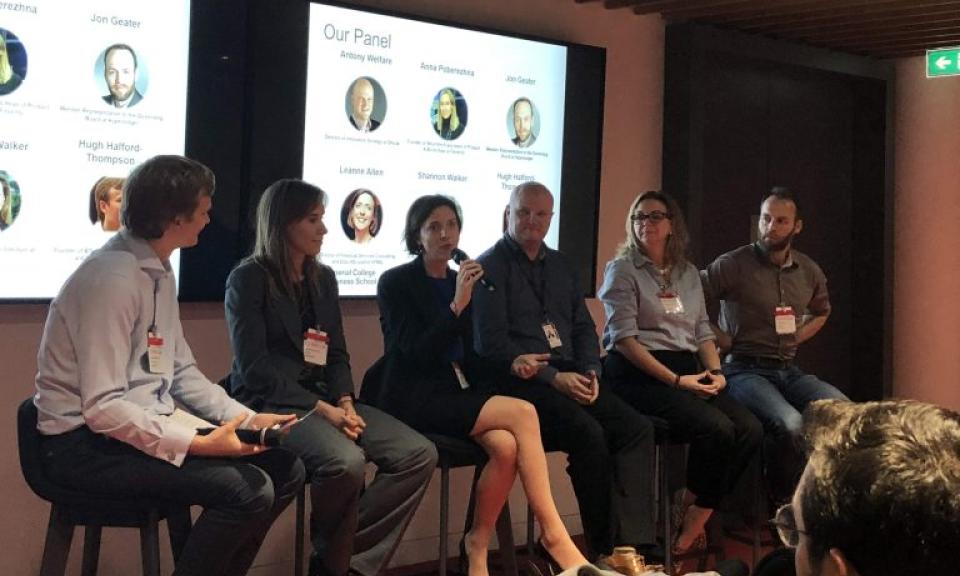
The Imperial Women’s Network joined forces with Oracle Women in Leadership and Oracle Women in Technology to host an event on innovation in banking and financial services (6 Nov 2018).
The keynote speaker Antony Welfare, Director of Innovation Strategy at Oracle, provided a thorough introduction to blockchain and the impact it is already making in commerce and banking. Antony guided the 60-strong audience of Imperial College and Business School alumni, students and guests, through the “transformational” impact blockchain is having across all industries.
“Blockchain is a system for maintaining distribution ledgers in a peer-to-peer network, allowing multiple parties, which may not have full levels of trust, to do business, in real time while reducing the need for third party interaction.”
How did blockchain come about?
Antony discussed how recent high profile, online personal data breaches have eroded consumer trust. The disruptive technology of blockchain aims to reverse this and increase transparency, security, quality and efficiency for business. “Blockchain can change the way sales take place. Sales will be direct between the buyer and the seller, cutting out the need for a middle man.”
Outlining the massive potential for this new process, Antony highlighted how investment in the technology has grown twice as much this year on last, with three times the number of jobs advertised in the sector. Last year £1bn spent last year on blockchain and it is estimated this will rise to nearly £10bn by 2021.
"Blockchain provides the consumer with a shared ledger of information, with validated/non-repudiable transactions. It provides a real-time version of the truth to all parties involved, reduces time and money spent on data and reduces the risk of fraud. This process can benefit many sectors from financial services, to supply chain, public sector and healthcare"
However that blockchain “won’t fix everything” he cautioned. It will rely on standardised processes to ensure data is recorded and actioned in the same way. Antony outlined how blockchain is already impacting the food supply industry from olive oil to fish, the automotive industry as well as the shipping industry and parcel deliveries. For financial services the benefits include cross border fund transfers, billing systems and procurement.
The second keynote came from Marta Piekarska, Director of Ecosystem at Hyperledger. Marta explained how Hyperledger, a global, cross-industry consortium of communities advancing business blockchain technologies, evolved out of the decrease in trust levels with key institutions and banks. “Blockchain promises to change the way business is conducted and transactions are executed across industries. Precisely how, and the pace at which, each of these industries adopts blockchain will surely vary. There will never be one global chain-of-all chains that all industries convert to.”
Marta encouraged the attendees to get involved in the Hyperledger Fintech community.
Panel session
The panel session chaired by Hugh Halford-Thompson, a software entrepreneur and investor. The panellists were:
- Anna Poberezhna – Founder at Smart4tech and Head of Product & Blockchain at Finverity
- Shannon Walker – Director of Information Architecture at Deloitte
- Leanne Allen – Director of Financial Services Consulting and Data HQ Lead at KPMG
- Jon Geater – Member Representative to the Governing Board at Hyperledger
The next big thing
The panel discussed how the development of cloud technology and 5G, will enable new technological ideas to be actioned. Business is entering a period where ‘data is no longer king’ and companies are looking to reduce the amount of consumer data they hold. By encouraging big business and academics to work together, new technology will advance at a more rapid pace, as will our understanding of its application. There is a need for the information architecture that is developed to be modern enough to adapt to future developments.
Where are we in the blockchain hype-cycle?
Antony explained that: “Blockchain technology has seen a big change in the last 6 months, people are talking about it and wanting to know how it can help. This is the start of ‘real’ phase, with focus on real clients with real projects. In six months – a year the industry will see big strides forward. The hype is over, we are now into real world and real solutions.”
Start-ups seem to be adopting this faster, with more practical solutions to integrating blockchain. This is because it is easier to start integrating new process into businesses from scratch, rather than trying to add them into already complex and established ones. To achieve this big business will need to embrace shared collaborative business models.
Regulations: a hindrance or a help?
With the introduction of new GDPR regulations many big businesses are still on a journey in terms of controlling their data, spending vast sums of money on defence of data management. However businesses must not be afraid of regulation, instead they must liaise with the policy makers to ensure regulation is relevant, effective and achievable. The challenge however is that diplomacy moves slower than technology and standardisation is hard to achieve across borders and industries. Governance and social responsibility are not just about data, but people, and therefore everyone has a responsibility to learn and understand changes to technology, coding and regulations.
How can students equip themselves for the workforce of the future?
Leanne summed it up by saying; “Technology will force people out of jobs, but this is nothing new. It has happened before – the industrial revolution for example. Times move on, things change but people adapt. It is important to have a growth mind-set, be adaptable and resilient. Learn to be flexible, to up-skill and constantly learn for the next thing.”
You can watch a round up of the event here.
The Imperial Women’s Network will continue their theme of innovation with a discussion panel focusing on Innovation in Transport in February 2019. You can connect with their online community through the Imperial Women’s Network LinkedIn group.
